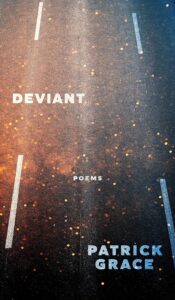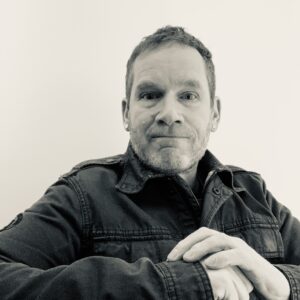On ‘what could be versus what is’
Deviant
by Patrick Grace
Edmonton: University of Alberta Press, 2024
$19.99 / 9781772127416
Reviewed by Brett Josef Grubisic
*

Online thesauri list “get sidetracked” and “drift” as synonyms for deviate, “turning aside” and “departure” for deviation.
Then there’s deviant: “bent,” “weird,” “freaky,” “heretical,” “twisted,” “perverse.”
It’s a charged word, an accusation, perhaps, or a categorizing term that demarcates—acceptable, normal, and natural on one side, the unwholesome opposite on the other.
In North America, deviant has historically been teamed with sexual, and, back to thesauri, the sexual deviant is synonymous with nymphomania, pederasty, and “sex freak.”
And with homosexuality, of course, as Dennis Altman noted over four decades ago in The Homosexualization of America:
There is no such thing as a value-free concept of deviance; to say homosexuals are deviant because they are a statistical minority is, in practice, to stigmatize them. Nuns are rarely classed as deviants for the same reason, although if they obey their vows they clearly differ very significantly from the great majority of people.
In Canada, where same-sex marriage has been woven into the social fabric for nearly twenty years and bestselling books with titles like Virtual Equality and Virtually Normal imply a post-Bad Old Days, post-Stonewall, and post-Gay Liberation actuality, Deviant, the debut book by Vancouver’s Patrick Grace, stands out for that title alone. Emblazoned on the cover, Deviant seems to revive an idea or prejudice or outlook that was retrograde, albeit commonplace, in the 1950s.

Now, in 2024, how dare deviant show its face. The very concept is outmoded and antique—right?—a relic like a leper colony or scurvy that belongs to a benighted era.
Well, not so fast.
As a whole, Deviant evokes memoir. Autopoetry, maybe, cousin to autofiction and descendent of confessional poetry (another term popularized in the ‘50s).
If the first-person speaker of many of the poems is not Grace himself, he’s a persona that shares the poet’s memories, outlooks, and experiences. Peering back at his stages—boyhood, adolescence, young manhood, and thoughtful, wholly adult male who’s been through the wringer and is taking stock—he’s seeing patterns and noticing tendencies. There’s an unresolved duality, for one.
Deviant starts arrestingly, with childhood episodes. With the prettiness—the phlox and bluebells, the finches and foxes—opener “Why Not” has a nostalgic glow. Two boys find a worn-out baseball and hurl the ball back and forth, “imitating / dads and uncles and older brothers—.” The poem ends with a ball thrown furiously and with intimations of days to come: the “boys learn the edges // of what they hold in their hand / when angered.”
Another vignette, “Dastardly” shows the boy in an old Volvo with his mother. Outside, a bratty kid in a black walnut tree pelts the car with shells and earns “that little shit” from the harried woman behind the wheel. For the boy, a different lesson. The kid seated on the branch gives the other boy “a onceover, the middle finger,” and the incident rouses the boy in the car: “devilish boy in red shorts / shaking something large and young / inside you to break it open.”
The breaking is an awakening, a glimmer of awareness about an identity, about nascent passions that will rule over him and lend Deviant a title.
Quite naturally, awareness and action evolve throughout adolescence. In “The First,” the speaker spies on the next door neighbour with a thick white towel around his waist. He comes to “know the word / for what I am.” The poet shows boyhood at a slant: routine emblems—play with baseballs, old toys, and a water gun—mean something different for the boy of the poems that they do to his feral buddies.
Similarly, in “Ravine,” a danger—“Before cell phones, men hung around // to watch and wait for the moment / a mother’s eyes turned away”—is refashioned as both a temptation and an initiation. “I followed him down,” the speaker recalls, “to the ravine where signs warned….”
Still “a boy with boyhood dreams” in “Nightcall,” the speaker recollects wearing “hot pink shorts” and facing a beating by other boys near railway tracks in Vancouver. The memory ends ambiguously: “leaning to taste // other boy’s spit and dreaming / it could be warm, secreted / special, just for my mouth.”
Grace’s portrait evokes a complex contradiction, an unsanctioned and unwelcome yearning for others that finds little or no (or secret) reciprocation; spat on, the boy imaginatively transforms the brutality into a libidinal intimacy. He dreams of what may never be.
Later, in Grace’s hands, consummation—“I was a boy / and I was lying with another boy”—is coupled not with love, exhilaration, or fulfillment but “terror’s first pinch at my hamstrings, / wolf in my throat and leaping.”
Later still, studying The Unwritten Rules of PhD Research and aware “My body must give / express consent,” the speaker confides about a sexual adventure with a trucker—“I proposition the short one around back with a popped-fly blowjob”—as his mother texts “need money? coming home?”
Episodes—with strangers: “this one like my gym teacher / this one like my bus driver”—evoke the pleasures of sexual experience, true, but also something else—a futile but persistent search for a feeling or sensation from a remote past that may never be regained. And with it, the clear knowledge that his actions speak of compulsions that in turn bring to mind addictive behaviours: “I’d like to tell him // this is the last time, / turning the same corner / of what could be versus what is.”
Between “both of us woozy in our reverie” and “Tomorrow I’ll say my name / to a stranger for the first time,” the speaker’s successive encounters are rendered as hopeful, if disheartening. Sparks that fly die out; dreamy states turn into incident reports.
From “Years after you robbed me for a hit of smack” in “Afloat” and “I wrapped my sprained wrist in tensor // to hide the bruises where his hands / held me down” in “Tilt,” to scenes of police interviews and emergency calls—“Can you tell me…. What is your location…. Is the danger immediate”—in “Document,” resolve to seek physical connections is met by violent complications.
The speaker’s predicaments reach a disturbing logic in “As You Were”: “I wish you’d follow / up on that promise to break / every one / of my fingers / so I can point myself / in a new direction.”
A striking image from one of Grace’s sketches of childhood comes in “Someday You Will Ache”: “I spread-eagled over the asphalt—it was the warmest hug I’d ever felt.”
Far from being a subject for a case study or criminology class, Grace’s deviant searches for customary destinations: love, freedom, satiation, contentedness. Exposed to a world of lessons and rules and norms that ceded little territory for the likes of him, the boy sought out illicit spaces made for and by men like him. Savvy about his mistakes and perpetually committed to self-renewal, he does what he can. Along with the rest of us.
*

My Two-Faced Luck, the fifth novel by Salt Spring Islander Brett Josef Grubisic, published in 2021 with Now or Never Publishing, is reviewed here by Geoffrey Morrison. A previous novel, Oldness; or, the Last-Ditch Efforts of Marcus O (2018), was reviewed by Dustin Cole. [Editorial note: A BCR editor, Brett Josef Grubisic has reviewed books by Cole Nowicki, Tania De Rozario, John Metcalf (ed.), Brandon Reid, Beatrice Mosionier, Hazel Jane Plante, Sam Wiebe, Joseph Kakwinokanasum, Chelene Knight, Lyndsie Bourgon, Gurjinder Basran, and Don LePan for BCR.]
*
The British Columbia Review
Interim Editors, 2023-25: Trevor Marc Hughes (nonfiction), Brett Josef Grubisic (fiction)
Publisher: Richard Mackie
Formerly The Ormsby Review, The British Columbia Review is an on-line book review and journal service for BC writers and readers. The Advisory Board now consists of Jean Barman, Wade Davis, Robin Fisher, Barry Gough, Hugh Johnston, Kathy Mezei, Patricia Roy, Maria Tippett, and Graeme Wynn. Provincial Government Patron (since September 2018): Creative BC. Honorary Patron: Yosef Wosk. Scholarly Patron: SFU Graduate Liberal Studies. The British Columbia Review was founded in 2016 by Richard Mackie and Alan Twigg.
“Only connect.” – E.M. Forster